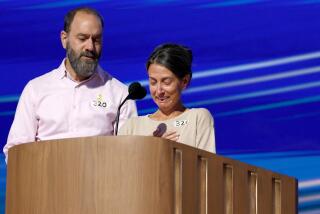Arafat Fails to Speak to Moderates of Israel
- Share via
Under monumental U.S., Egyptian and Arab-moderate pressure, Yasser Arafat finally uttered the right words. However, in front of the Palestine National Council in Algiers, Arafat’s true constituency, he did not utter the required words.
In fact, there was no difference between what Arafat said in Geneva and in previous statements. What Secretary of State George P. Shultz hoped to do is ease the way for President-elect George Bush and his advisers on the road to peace.
What does this move mean to peace in the Middle East? Years of rhetoric will not do for deeds. An American “contact” and “serious dialogue” with the Palestine Liberation Organization is no substitute for PLO-Israeli dialogue and negotiation.
In Geneva, as in Algiers, Arafat failed to address the audience that he needs to address the most--Israel’s political moderates, all of whom are ready for some kind of compromise on the Palestinian issue, as are 70% of the voters in Israel.
The issue of whether Arafat and the PLO recognize Israel or not is, in my view, secondary as far as the Israelis are concerned. After all, Israel is a stable, modern state and democracy, a legitimate member in good standing of the community of nations, and hardly needs the imprimatur of a terrorist organization steeped in Israeli, Jewish, Arab, American and European blood.
The principal conclusion that one can draw from the basically unsubstantive public-relations stunts in Algiers, Stockholm and Geneva is that Arafat can no longer lead the PLO and the Palestinians into the future--if ever he really could.
Arafat is a well-established master of words, not deeds. I have great doubts; in fact, I’m convinced that the head of the Palestine liberation movement will not dismantle the terrorist machinery to substantiate the dubious language that was foisted on him by American and Arab diplomats. It may just be that Arafat has been around too long.
Opportunity always beckoned for Arafat and his organization, and was always squandered. In 1982 President Reagan and Shultz called for negotiations among Jordan, Israel and the Palestinians. At first Arafat accepted a partnership with King Hussein, only to renege in 1985, which may account in large part for Hussein’s removing himself from the Palestinian arena this year.
In 1987, while Arab moderates wrung their hands and waited, something unexpected happened: Young Palestinians, frustrated by lack of action from their so-called leaders, took matters and rocks into their own hands by organizing themselves into an uprising that, as it continued, came to be called the intifada. This uprising on the West Bank and in the Gaza Strip was not only a show of defiance against the Israeli occupation; it was also an act of defiance toward the PLO and Arafat, which neither initiated nor led the revolt, nor managed to co-opt it.
The appearance of the “moderate” Arafat at the Algiers conference last month was very much a response to the intifada . Even though Western leaders--with the singular exception of the United States--seemed optimistic, Arafat said nothing new; he only appeared to do so. He only indirectly recognized Israel, and clung to the PLO’s bloody charter, which was not enough for Washington--and certainly not for moderate and liberal Israelis.
The only conclusion, after much verbiage on the part of Arafat, is that he must step down as the leader of the PLO, perhaps in favor of some young, more pragmatic West Bank Palestinian with an acceptably moderate attitude toward Israel and an Israeli electorate that is sick of the uprising and the divisions that it has caused within Israel.
Arafat served his people and his purpose--he organized, he fought, he indoctrinated and he gained both notoriety and qualified acceptance for the Palestinians and their cause. He carried the PLO flag, quite often against difficult odds. But his policies, which never really changed and often served his political survival first and the Palestinian cause second, have reached the end of the road. He cannot reach out now to work with those on whom further gains depend. Arafat must go, and with him the dangerous radical terrorists he caters to.
Arafat must go. He and his organization are still sworn to liberate Palestine by force, notwithstanding the charade of words that we have heard in the last 10 days. The mantle must go to the true moderates, to those who do not own a terrorist machine, who do not live in the Palestinian diaspora, who have their roots in Palestine itself.
A new leadership must rise within the PLO and take it toward the road of peace, negotiations and openness to compromise. The Palestinians, after 40 years in exile, are being badly served by a stultified, unbending old leadership. Those leaders have failed to realize that there has been a change in the international and regional atmosphere, and in this failure they serve the interests of Israeli militants and annexationists who feel that there is no reason to compromise as long as they are faced with Arafat.
More to Read
Sign up for Essential California
The most important California stories and recommendations in your inbox every morning.
You may occasionally receive promotional content from the Los Angeles Times.













